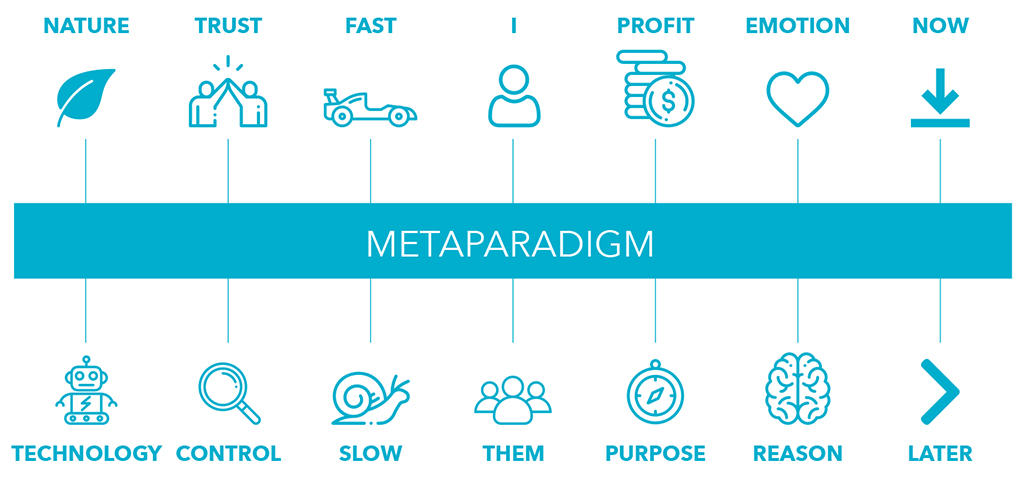CHAPTER 4 META IS THE NEW BLACK
Once problems become ‘wicked’, changes are systemic and challenges grow to a global scale, the old answers just won’t do anymore. Our old paradigm is losing relevance and our reaction to it is dividing the world in zeroes and ones, thinking in opponents, excluding fruitful differences and complexity. Our clinging to the old paradigm has made us more insecure, distrustful and isolated. Looking at all the false oppositions we listed, there is no solace going in the opposite direction either, striving for an analogue, all-natural world where constant dialogue replaces competition, we fear speed and individuality. The hippies had a point, but that wasn’t it. Moving from one extreme into another won’t help us out, it will only cripple us more.
We see a solution in merging what are seemingly opposites. With every technological advancement, the distinction between analogue and digital fades to phygital. The same thing can be said for online and offline. When everything and everybody is constantly connected, actively or via smart objects, there is no use in trying to draw a line. Even when we ‘go offline’, our online identities continue to be available, traceable, active. Besides, ‘going online’ is a sentence used by people who still use Teletext. Point made.

If you step into a factory today, you can’t really say if it’s run by robots or humans. They’re two peas in a pod and have been working together for many years, ever since Henry Ford installed the very first automated production line. The same goes for the opposition between virtual and physical – we lost that divide when we launched Pokémon Go. Technology isn’t alien, it enhances and augments our physical reality. It adds a layer to it that can’t be removed anymore. It’s become too thin and blends too seamlessly into our more tangible world.
The western divide between reason and emotion, or the duality between mind and soul, cannot and should not be sustained any longer either. We are both, we should cultivate both and we need both in order to survive the next decade. But we will need more than that. The main oppositions we want to demystify in this book are the ones between trust and control, profit or purpose and the short vs. the long-term horizon. Because these three are so very intertwined, tweaking the way we look at them can generate a ripple effect.
Time feels like something scarce, but taking it slowly might actually save you some. Lowering the pace can also help you to broaden your horizon beyond Dollar bills. Of course, we know a company has to stay on top of the numbers to be financially healthy. But we are pretty sure that if you and your team would focus on values and societal impact, the numbers wouldn’t suffer. Much to the contrary. Same goes for the eternal quest for balance between the short and the long term, striving for that instant gratification, while keeping an eye on how this might impact fellow beings or the planet in the long run. It is a tricky one, especially in business, to find an equilibrium between austerity and investment, risk and reform, but keep in mind that every answer that tries to balance the long and the short term, is much better than choosing one or the other. By far.
On to the next one
Our paradigm is over and done with, leaving us with numerous unanswered questions and the quest for a new one. Well, the most suitable answer to all our unanswered questions is to accept there isn’t one. It is the time to move away from big answers, dogmas and rigid structures. Tiring as it is, the world is a complex system. If we ignore all its layers, we lose sight of the possibilities it holds, of its potential for change. If we make room for doubt, uncertainty and nuance, however, we will be able to collaborate and innovate. We have to learn to make it up as we go along. But this requires trust, and trust takes time – the one thing we are always short on.
The new paradigm we want to present, functions both as a bridge between false oppositions and as an attitude that can bridge uncertainty. Both functions are very relevant in these messy times where fear makes us close off. This new paradigm goes beyond the illusion of one-size-fits-all, of the big truths. But it is a story we can believe in, one that can unite and guide without reductionist side-effects, one that has self-reflection built into its core.
We call it the metaparadigm, and it teaches us how and when trust can take over from control and why we shouldn’t choose between profit or purpose. It is, we believe, the best option, both for people to have a life worth living and for companies to survive the next decade. Action emerges in the gap between what is, and what could be. So we have to be bold enough to honestly analyze the state of the world, and brave enough to imagine what we wish it to be. It’s time to shift paradigms. And it’s up to us to do it. Together.